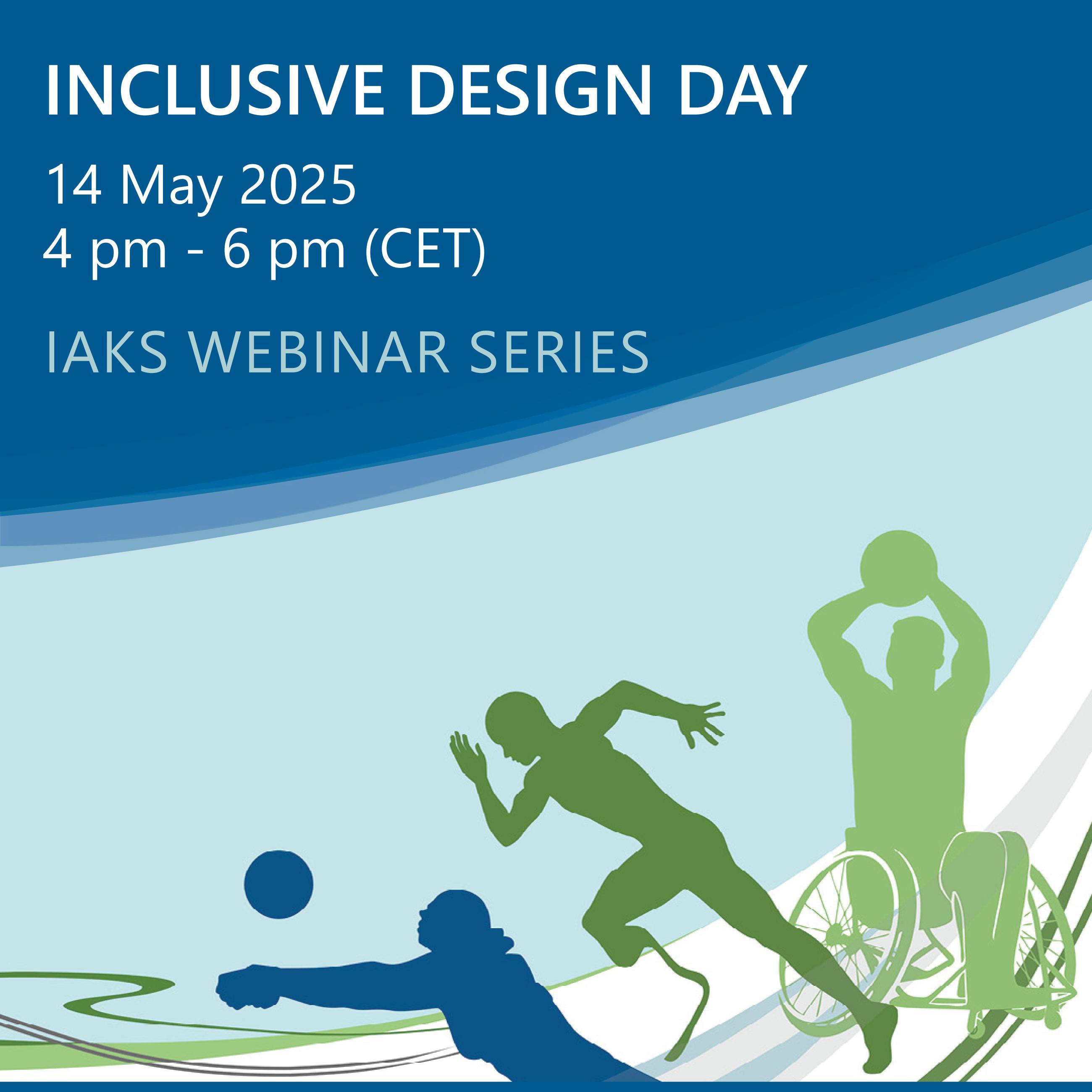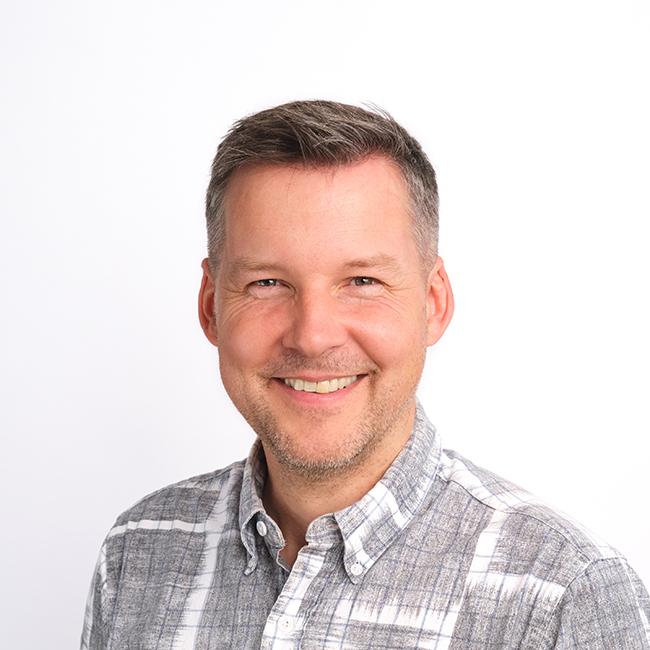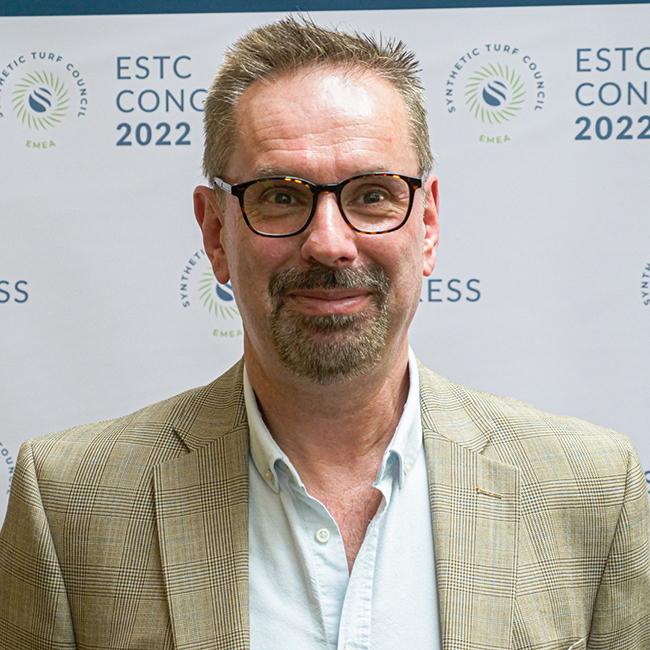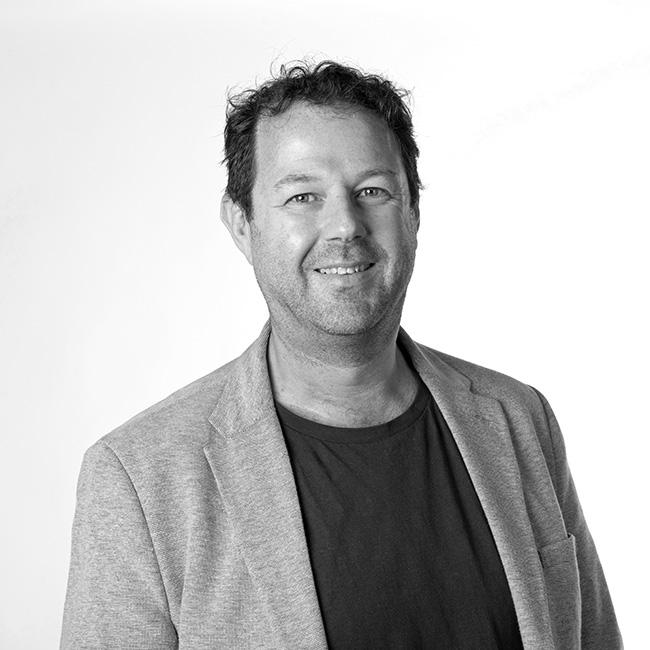IAKS webinar series - the idea
We are excited to announce a series of webinars dedicated to addressing the most pressing developments in the world of sports and leisure facilities. Over the coming months, we will be exploring key themes like Sustainability, Inclusive Design, and Infastructure with the help of top experts from the IAKS network.
These webinars will not only provide insights into the latest trends, challenges, and solutions shaping the future of sports and leisure spaces, but also lay the groundwork for the 2025 IAKS Congress in Cologne - a premier event held every two years, where you will have the opportunity to connect in person with our speakers and network with other professionals in the industry.
Next IAKS webinar series on INCLUSIVE DESIGN is about to start!

Building on the success of our IAKS webinar series launch on SUSTAINABILITY, we are excited to continue this momentum in March with a new focus: INCLUSIVE DESIGN.
Kicking off on 14 May from 4pm - 6pm (CET), the cross-sports facility Webinar Day on INCLUSIVE DESIGN will provide a broad overview of inclusive design in sports and leisure facilities. Following this, a series of interactive follow-up webinars will explore the topics in greater depth,
With Inclusive Design, we aim to move the focus of our webinars from specific types of sports facilities to the perspectives of the people involved in these projects:
•Designers: How do those who design and build sports and leisure facilities approach inclusive design?
•Athletes: What are the needs and expectations of athletes when it comes to inclusive sports and leisure venues? We are exploring a potential collaboration with the IPC for this webinar.
•Spectators: What are the key factors, trends, and developments in inclusive design for spectators?
•Operators and programming : How can health-oriented facilities such as pools support inclusivity? What features and programming are required to fulfill this role effectively?
•The Social Impact: How do community hubs and centers foster inclusivity and contribute to a more inclusive society?
Mark your calendars for this free online event AND advance the conversation on creating accessible and inclusive spaces for all!
Catch the highlights from IAKS webinar series on SUSTAINABILITY!
IAKS Sustainability Day presented five dynamic speakers - Mike Hall, Mark Palmer, Davit Jarratt, Marc Downing, and Prof. Alastair Cox - and engaged over 70 participants in insightful sessions that showcased the latest trends and developments in sustainability within the sports and leisure facilities industry.
IAKS webinar 30.10.2024
Get the recordings of the interactive IAKS follow-up webinars on SUSTAINABILITY!
The IAKS is proud to offer a unique asset within the sports and leisure facilities industry - a dynamic network of experts and visionaries committed to shaping the future of this field. Our goal is to share this invaluable knowledge not only with our members but also with the wider public, enhancing sports and leisure facilities for all.
Following our IAKS webinar day on sustainability, five distinguished speakers hosted in-depth follow-up webinars, providing further insights and detailed discussions on their topics.
These session recordings are now available free of charge for IAKS members. Contact us for more details, and we will gladly provide you with the link to the session(s) you’re interested in.
Don’t miss this unique opportunity to learn from industry leaders and fuel your passion for creating more sustainable sports and leisure facilities.
Sustainability in pools and recreation centres with Mark Palmer, Mark Palmer, Max Fordham UK

Swimming pools and leisure centres must deliver high-quality environments for a wide variety of activities. However, the construction and operation of these facilities can lead to significant energy consumption and environmental impacts. In his session, Mark will share innovative ideas on how we can maximize the benefits while minimizing the environmental footprint of our swimming pools and recreation centres.
Meet Mark Palmer
Mark is a Director of Engineering and the Sports Sector Leader at Max Fordham, bringing nearly 30 years of experience in designing high-performance, sustainable sports facilities. His impressive portfolio includes everything from Sport England's “optimum” sports halls to the Olympic Water Polo Arena for London 2012, and the multi-award-winning Oriam (Scotland's National Performance Centre).
Recently, he completed the Ravelin Sports Centre at the University of Portsmouth - one of the UK’s most sustainable ultra-low energy sports centres, boasting a BREEAM 'Outstanding' rating. Mark is also a proud member of the UK Net Zero Carbon Buildings Standard group for Sport & Leisure, showcasing his commitment to a greener future.
Zero carbon in ice arenas with Marc Downing, MJMA, Canada

Marc’s presentation covered game-changing strategies to reduce both embodied and operational carbon in ice arenas. In North America, these community hubs serve as the heart of many towns, hosting everything from hockey practices to movie nights. As we push toward a zero-emissions future, these buildings face unique challenges - especially given their energy-intensive operations.
Join Marc for a deep dive into practical solutions and visionary strategies for meeting zero-carbon goals in ice arenas.
Meet Marc Downing
Marc brings a unique passion for helping clients realize their vision, believing that “a great building will outlast us all.” His work focuses on creating durable, hybrid-use spaces that inspire communities for generations. Beyond architecture, Marc is also an accomplished musician with a deep appreciation for spaces that spark creativity and connection.
Synthetic turf: Product environmental footprint rules with Prof. Alastair Cox, ESTC, UK

Synthetic turf offers long-lasting, high-performance surfaces that support sports activities in all weather conditions. But like any man-made product, it leaves an environmental footprint. Over the past four years, the ESTC has been working closely with the European Commission to develop Product Environmental Footprint (PEF) rules for synthetic turf. This groundbreaking initiative allows manufacturers to accurately assess and reduce the environmental impact of their products - from production to disposal.
The new PEF rules give consumers and buyers the tools they need to make informed, sustainable choices. For the first time, you can compare products based on their true environmental impact, enabling sustainability to play a central role in your decision-making process.
Meet Prof. Alastair Cox
With over 45 years of industry expertise, Alastair has dedicated his career to ensuring the highest standards in the synthetic turf industry. As a leader in testing and certification, he plays a pivotal role in shaping the future of sustainable practices across Europe, the Middle East, and Africa. His collaboration with regulatory bodies, standards committees, and sports organizations has made him a true champion of innovation.
Sustainability in the sports and leisure facilities industry with Mike Hall, FaulknerBrowns, UK

Sports and leisure buildings often represent significant carbon challenges for municipalities, consuming large amounts of energy and materials. From the long spans of arenas to the complex substructures of swimming pools, reducing embodied carbon can be a difficult task. And when we consider the whole life cycle of these often-inflexible facilities, the sustainability challenge becomes even greater. Mike will dive into key issues like benchmarks, best practices, and how to navigate sometimes misleading sustainability terminology. Most importantly, he’ll explore practical methodologies to create more sustainable sports and leisure facilities - showing how we can all play a role in driving meaningful change.
Meet Mike Hall
With extensive experience working alongside major sports governing bodies like FINA, UCI, IAAF, and ICF, Mike has a deep understanding of the unique demands placed on sports facilities. He’s also a member of the IAKS International Expert Aquatics Circle and a representative of the International Union of Architects. Mike is a passionate advocate for sustainable, active infrastructure in our towns and cities, and his insights are sure to inspire.
Sustainability in stadiums with David Jarratt, Populous, UK

Stadiums and sports arenas are among the most carbon-intensive buildings, often used infrequently by large crowds. For instance, the last three FIFA World Cups each emitted an astonishing 2.2-2.8 million tonnes of carbon! It's crucial that we enhance sustainable design and construction practices in these facilities. The benefits are immense: not only will we help combat climate change, but we’ll also see reductions in energy consumption, construction costs, and insurance premiums, all while contributing to national and international emissions reduction targets set by organizations like FIFA and the IOC.
David shares how Populous is leading the charge with strategies that emphasize a values-based approach and the development of a net zero carbon design toolkit, ensuring optimum value for owners and stakeholders while addressing the urgent climate crisis.
Meet David Jarratt
As the EMEA Sustainable Design Lead for Populous, David brings over two decades of global sustainability leadership to the table. His expertise lies in crafting and implementing long-term strategies that maximize benefits for all stakeholders, including investors, asset owners, building users, and the community. David’s commitment to innovation ensures that each project not only meets industry standards but also pushes the boundaries of sustainable design.